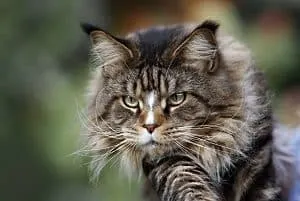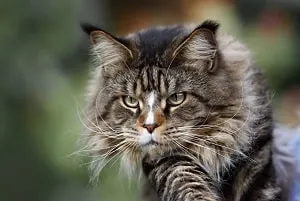 Maine Coon cats come in all shapes and sizes, which means that they will have a unique life expectancy and health issues that can affect their lives. If you’ve ever owned a Maine Coon, you might be wondering how long they ill live and what to expect at each life stage as they become adults. So, what is the Maine Coon life expectancy?
Maine Coon cats come in all shapes and sizes, which means that they will have a unique life expectancy and health issues that can affect their lives. If you’ve ever owned a Maine Coon, you might be wondering how long they ill live and what to expect at each life stage as they become adults. So, what is the Maine Coon life expectancy?
The Maine Coon life expectancy is 10 to 15 years. Data suggests most Maine Coon cats live to be 12.5 years or older. Certain factors can also affect the life expectancy of a Maine Coon. Cats who are fed a proper diet, exercise regularly, and routine veterinary care live longer.
Keeping your cat healthy and understanding the factors that go into a long life can help your cat live much longer. In this article, we’ll talk about the lifespan of a Maine Coon cat, what to expect at various stages of their development, and how you can help them live their longest most healthy life.
Maine Coon Lifespan
Maine Coons are seen as a hardy and sturdy breed, given their muscular bodies. Their origins stem from harsh weather and the sea, so they had to be strong and resilient. So it might be surprising to learn that the average lifespan of a Maine coon cat is a mere 10 to 15 years. That’s not to say it’s short, it’s just shorter than one might expect.
Maine Coons fall in a very average group. Most breeds of cat have a similar life expectancy or fall within this range. There are some outliers with a very slim difference.
Other breeds of cats don’t stray far from this number, either. A Manx cat has an average life expectancy of 8 years, the shortest length compared to other breeds. This is only a 2-year difference from the Maine Coon. Some cats, such as the Siamese, live a reasonably long life- up to 20 years.
Although the life expectancy for a Maine Coon technically ends at 15 years old, that’s not a definite number. It is not unheard of for cats to live into their 20s. Of course, certain factors are important to consider.
Life expectancy factors
Maine Coon cats are quite unique when it comes to life expectancy given their size. Below are a few factors that contribute to their life expectancy that you should be aware of.
Purebred Vs Mixed Maine Coon
The breed of cat and if it is a purebred is a crucial factor in terms of life span. A study in the UK found that mixed breeds lived an average of 14 years, and purebreds average 12.5 years. That’s quite fascinating as purebred cats tend to cost more and are more sought after when it comes to cats. In this case, A purebred Maine Coon may not live as long as a mixed breed. This certainly something to be aware of if you’re in the market for a pet.
Maine Coon Diet
The right kind of nutrition is vital for your kitty and their health. Quality foods ensure that they are getting the right kinds of minerals to support their body and health. Low-quality food might not provide all of the necessary nutrients. In general, you want to feed your Maine Coon a raw food diet whenever possible.
By doing this, your cat can get all the essential ingredients without having to eat processed foods. If you don’t have the ability to make your own cat food, then consider purchasing really high-quality food. Brands such as Royal Canin and Purina have higher priced foods geared towards bigger cat breeds such as the Maine Coon.
Also, be careful to not overfeed your Maine Coon. Maine Coon cats are always hungry, but stick to your portions and feeding schedule!
Exercise
Maine Coon cats are exceptionally large. The biggest they can get is around 20 pounds! So with that said, exercise is crucial for such a large cat. The weight of a Maine Coon is the biggest difference compared to normal cats.
Exercise is an essential factor to avoid feline obesity. Obesity in cats is seen more frequently nowadays than in past years. Just like humans, if a cat is overweight, it can lead to additional health concerns.
Stress
There is a difference between acute stress and chronic stress. If cats are chronically stressed, it can lead to various health concerns and behavior changes. Lack of affection in Maine Coons is almost always caused by stress too. The happier your cat, the healthier they will be.
Health Concerns
Different breeds have different genetic health concerns. On top of that, some cats just need more medical attention than others. There are several common illnesses to be on the lookout for. Be sure you are giving your cats regular health screenings.
Environment
This is a fairly broad category. There is a difference in lifespan between indoor and outdoor cats, which we will dive into. Aside from that, things in the environment could be other cats that aren’t friendly, continuous stressors, or unsafe chemicals.
Some of these factors are predisposed, such as breed and genetics. However, other factors are in your control.
Indoor vs. Outdoor Cats
The most significant difference between outdoor and indoor Maine Coon cats concerning health is the safety of their environment.
Indoor cats live longer because they are in a safe environment. Outdoor cats have a lot to worry about. Outdoor cats have a lower life expectancy because of the risk of cars, dogs, other cats, and various toxins. Things like car exhaust and fertilizer can make an outdoor cat sick.
Another reason why outdoor cats don’t live as long as indoor cats is the fact they are not being looked after. An indoor cat’s owner can observe any health concerns quickly and take them to a vet. Outdoor kitties don’t have that luxury.
If you do have an outdoor cat, please supervise them.
Health Problems in Maine Coons
Like all purebred cats, Maine Coons have genetic health conditions that affect the quality of their life. Veterinarian Dr. Lee Pickett explained that there are three main health concerns that Maine Coons can inherit.
● Hypertrophic Cardiomyopathy (HCM)- Thankfully, there’s an acronym for this. HCM is a heart condition where the heart walls are too thick to contract properly. 1 in 3 Maine Coon cats will inherit the gene that causes this. Usually, this can be caught early in life. Check with your vet to see if they can do an ultrasound.
● Hip Dysplasia- This condition affects the formation of the hip joint. 23% of Maine Coons have this condition, which can lead to arthritis in the hip. Stiffness and limping are common side effects to hip dysplasia. One study found that males have a slightly higher chance of developing hip dysplasia than females. It is also more common in older cats than younger cats.
● Spinal Muscular Atrophy (SMA)- SMA is seen early on in a kitten’s life. This is a genetic disorder where the spinal cord does not develop normally. The kitten will have trouble walking and lose muscle in the back legs.
Genetic disorders can be managed, and you can still give your kitty a good quality of life. However, depending on the condition, it could be a shorter life.
How to Increase Life Expectancy
It is not unheard of for a cat to live into their 20s, especially Maine Coons. There are things you can do to help your cat have a healthy and long life.
● Take your cat to get regular checkups– your vet will be able to do regular exams to ensure your cat’s health. Your vet will most likely check the ears, eyes, coat, nose, paws, and provide an overall screening.
● Keep your cat indoors more often than outdoors– as we discussed earlier, outdoor cats have a shorter lifespan than indoor cats. Try to keep your kitty inside. Sometimes that is difficult! I was able to get my cat on a schedule. He was allowed to go outside when I got ready in the morning, and he came back when I shook the treat bag. Another great option is to get your pet microchipped.
● Balance their diet– a proper diet is essential for your cat’s health. Feed them quality foods that are packed with nutrients. Monitoring how much they eat, also prevents obesity.
● Playtime– mental stimulation is just as important as physical activity. Giving your cat time to play is essential for your cat’s brain health.
● Check their teeth– a cat’s teeth can tell a lot about their health. Healthy gums are a sign of a healthy cat. If there is tartar build-up, the teeth can begin to decay or even come loose.
● Clean their litter frequently– Litter boxes are a breeding ground for bacteria and germs. If the litter box is not changed often, it can cause health problems. Also, frequently cleaning the litter box gives you peek and the digestive and urinary tracts of your cat. You can check for malformed feces, blood, or diarrhea that can point to health problems.
● Constant monitoring– merely keeping an eye on your furry friend is essential. Cat’s don’t usually show when they are sick or hurt, so it’s necessary to be diligent and watch carefully. This way, you can act quickly when you notice changes in your cat.
Conclusion
Maine Coons are a very sturdy breed with an average lifespan of 10 to 15 years. With proper measures, you can give your cat a long and high-quality life. However, like all purebred animals, there are genetic disorders that can cause a shorter lifespan in Maine Coons. Be sure you are taking your kitty to the vet for regular checkups and monitoring them at home.

My name is James, and welcome to FAQCats!
Along with our team of cat owners, expert pet enthusiasts, and pet professionals, we aim to write engaging helpful, engaging content about cats. At FAQCats we strive to provide content that’s accurate and fun to read. Our team writes about everything related to cats; even the most complex of topics. Through extensive research and caring for our own fur-pals, we’re able to provide something cat owners worldwide will love. Have a look around, and leave us feedback anytime!

